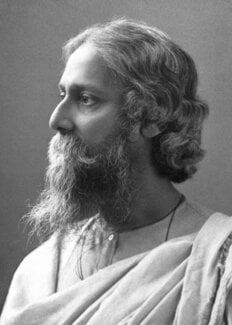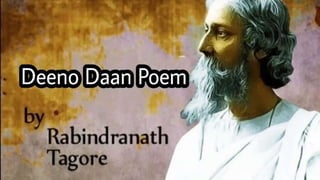This task is assigned by Megha Ma'am. In this blog I am going to write my Understanding of the Poem "Deeno Dan" by Rabindranath Tagore.
About Rabindranath Tagore
Rabindranath Tagore (1861-1941) was the youngest son of Debendranath Tagore, a leader of the Brahmo Samaj, which was a new religious sect in nineteenth-century Bengal and which attempted a revival of the ultimate monistic basis of Hinduism as laid down in the Upanishads. He was educated at home; and although at seventeen he was sent to England for formal schooling, he did not finish his studies there. In his mature years, in addition to his many-sided literary activities, he managed the family estates, a project which brought him into close touch with common humanity and increased his interest in social reforms. He also started an experimental school at Shantiniketan where he tried his Upanishadic ideals of education.
From time to time he participated in the Indian nationalist movement, though in his own non-sentimental and visionary way; and Gandhi, the political father of modern India, was his devoted friend. Tagore was knighted by the ruling British Government in 1915, but within a few years he resigned the honour as a protest against British policies in India.
Tagore had early success as a writer in his native Bengal. With his translations of some of his poems he became rapidly known in the West. In fact his fame attained a luminous height, taking him across continents on lecture tours and tours of friendship. For the world he became the voice of India’s spiritual heritage; and for India, especially for Bengal, he became a great living institution.
While Tagore pursued writing, teaching, and activism during much of his life, he became recognized as a painter when he was in his sixties, with many of his works enjoying success at exhibitions in Europe.
Tagore died on August 7, 1941, in Calcutta.
About Poem "Deeno Dan"
“There is no god in that temple”, said the Saint.
The King was enraged;
“No God? Oh Saint, aren’t you speaking like an atheist?
On the throne studded with priceless gems, beams the golden idol,
And yet, you proclaim that’s empty?”
“It’s not empty; It’s rather full of the Royal pride.
You have bestowed yourself, oh King, not the God of this world”,
Remarked the saint.
The King frowned, “2 million golden coins
Were showered on that grand structure that kisses the sky,
I offered it to the Gods after performing all the necessary rituals,
And you dare claim that in such a grand temple,
There is no presence of God”?
The Saint calmly replied, “in the very year in which, twenty million of your subjects were struck by a terrible drought;
The pauperized masses without any food or shelter,
came begging at your door crying for help, only to be turned away,
they were forced to take refuge in forests, caves, camping under roadside foliages, derelict old temples;
and in that very year
when you spent 2 million gold to build that grand temple of your’s,
that was the day when God pronounced:
“My eternal home is lit by everlasting lamps,
In the midst of an azure sky,
In my home the foundations are built with the values:
Of Truth, Peace, Compassion and Love.
The poverty stricken puny miser,
Who could not provide shelter to his own homeless subjects,
Does he really fancy of giving me a home?”
That is the day God left that Temple of yours.
And joined the poor beside the roads, under the trees.
Like emptiness of the froth in the vast seas,
Your mundane temple is as hollow.
It’s just a bubble of wealth and pride.’
The enraged King howled,
“oh you sham cretin of a person,
Leave my kingdom this instant’.
The Saint replied calmly,
“The very place where you have exiled the Divine,
Kindly banish the devout too".
This is whole Poem by Tagore which is originally written in Bengali but after it translated in English. Here is Link of Barad sir's blog on this Poem:- https://blog.dilipbarad.com/2020/08/tagore-deeno-dan-impoverished-gift.html.
"Deeno Dan" by Rabindranath Tagore is a profound poem that delves into the themes of spirituality, materialism, compassion, and social justice. The poem opens with a Saint's audacious proclamation that there is no god in the temple, which immediately rouses the King's anger. The King, in his opulence, believes that the grand temple, adorned with priceless gems and a golden idol, is a testament to his devotion.
The Saint, however, counters the King's belief by suggesting that the temple is not empty but rather filled with the King's own pride and ego. He contends that the King has placed himself on the divine throne, equating himself with the gods, thereby revealing the materialistic nature of the King's devotion.
In response, the King vehemently defends his actions, citing the vast amount of wealth he has spent on the temple and the rigorous rituals he has performed. He finds the Saint's assertion that there is no divine presence in the temple deeply offensive.
The Saint, undeterred, provides a compelling explanation for his claim. He recounts a year marked by a severe drought that left millions of the King's subjects impoverished and homeless. When these destitute people sought refuge and aid from the King, they were turned away, forcing them to seek shelter in forests, caves, and derelict old temples.
It is in this context that the Saint argues that God abandoned the temple on the very day the King celebrated its grandeur. God's new dwelling, according to the Saint, is a place of eternal light, truth, peace, compassion, and love. The King's failure to provide for his suffering subjects, despite his extravagant spending on the temple, signifies the departure of the divine from the temple and its relocation to be with the needy.
The Saint's words highlight the stark contrast between the King's ostentatious displays of wealth and devotion and the true essence of spirituality, which lies in acts of kindness, empathy, and service to those in need. The poem serves as a powerful critique of the King's hypocrisy, as he prioritizes materialism over the well-being of his people.
Despite the King's enraged response and his command for the Saint to leave the kingdom immediately, the Saint remains composed and offers a final, poignant suggestion. He implies that if the King banishes the Divine from his kingdom by neglecting the suffering of his people, he should also banish those who follow a distorted version of spirituality.
In essence, "Deeno Dan" underscores the fundamental message that genuine spirituality is not defined by grandiose temples or extravagant rituals but by acts of compassion, truth, peace, and love. The poem critiques the social injustice and hypocrisy of those in positions of power and privilege who fail to care for their subjects and instead prioritize their own pride and material wealth. It challenges readers to reflect on the true nature of spirituality and the responsibilities of leadership in addressing the needs of the vulnerable.
let's delve deeper into the poem "Deeno Dan" by Rabindranath Tagore:
1. Irony of the Temple:
The poem begins with a paradox. The Saint's statement that there is no god in the temple is ironic because temples are traditionally seen as places of worship and divine presence. This irony sets the stage for the poem's exploration of true spirituality.
2. Materialism vs. Spirituality:
The central theme of the poem is the conflict between materialism and spirituality. The King's focus on building a grand temple with valuable gems and a golden idol represents material wealth and pride. In contrast, the Saint emphasizes that true spirituality is not about opulence but about values like truth, peace, compassion, and love.
3. The Hypocrisy of the King:
The King's anger at the Saint's words reveals his hypocrisy. He claims to be devout and generous in his religious practices, but he fails to provide for his suffering subjects during a drought. This exposes the hollowness of his devotion and highlights the contrast between his external displays of piety and his lack of compassion.
4. God's Departure:
The poem suggests that God's departure from the temple is a direct response to the King's actions. When the King turned away the needy and homeless, God abandoned the temple. This underscores the idea that true spirituality is not about rituals and wealth but about caring for those in need.
5. The Saint's Serenity:
Throughout the poem, the Saint remains calm and composed, even in the face of the King's anger. This underscores his wisdom and spiritual depth. He is unswayed by the King's threats and maintains his stance on the importance of genuine spirituality.
6. Banishment of the Divine:
The Saint's parting words challenge the King to recognize the consequences of his actions. If he banishes the Divine from his kingdom by neglecting the suffering of his people, he should also banish those who follow such a distorted version of spirituality. This emphasizes the idea that true spirituality requires a commitment to compassion and selflessness.
7. Critique of Social Injustice:
Beyond the spiritual message, the poem serves as a critique of social injustice and the neglect of the poor and vulnerable by those in positions of power and privilege. It highlights the moral responsibility of leaders to care for their subjects.
In summary, "Deeno Dan" by Rabindranath Tagore is a thought-provoking poem that challenges conventional notions of spirituality and underscores the importance of genuine compassion and empathy in one's religious and moral pursuits. It critiques the hollowness of materialism and the hypocrisy of those who prioritize grand displays of devotion over the well-being of their fellow human beings.
Connecting Dotes:-
In the midst of the COVID-19 pandemic, a person posted on Facebook, drawing parallels between Rabindranath Tagore's timeless poem 'Deeno Dan' and events of the past. They contended that the poem serves as a commentary on materialism overshadowing spirituality and highlighted the role of power dynamics. In the poem, the King's spending on grand projects, such as temple construction, was seen as driven by ego and pride, which they connected to a similar scenario in the past where people faced dire consequences due to financial issues, while government resources were allocated to initiatives like the construction of the Ram Mandir. While this interpretation reflects past events, it offers a thought-provoking perspective on the poem's themes.
Here is Link of Facebook Post which I am Referring.
In this blog what ever i have written is my interpretation, so if you have anything to say you can comment. Thank you so Much for Reading this blog.
{Words- 1776}


No comments:
Post a Comment